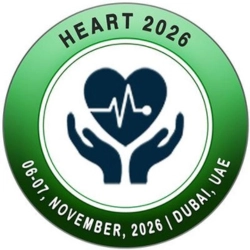Track: Cardiac Pharmacology and Therapeutics

Cardiac pharmacology plays a crucial role in the treatment and management of cardiovascular diseases (CVD), including coronary artery disease, heart failure, arrhythmias, and hypertension. Pharmacological treatments aim to alleviate symptoms, prevent disease progression, and reduce the risk of complications such as stroke and myocardial infarction. This session will delve into the mechanisms of action, clinical uses, and advancements in cardiac medications.
We will cover the role of commonly prescribed classes of drugs, such as beta-blockers, ACE inhibitors, anticoagulants, and statins, while exploring newer treatments, including gene therapy and novel anti-arrhythmic medications. Additionally, attention will be given to the importance of personalized medicine, drug interactions, and how to optimize pharmacological interventions in various patient populations, including those with comorbidities.
The cardiac pharmacology market is evolving rapidly with new drugs targeting heart failure, hyperlipidemia, and atrial fibrillation, as well as the development of biologics and gene therapies. These advancements have the potential to significantly improve treatment outcomes and patient quality of life.
Key Topics to Be Discussed:
1. Mechanisms of Action of Cardiac Medications
An in-depth discussion on how common cardiac medications, such as beta-blockers, ACE inhibitors, and calcium channel blockers, work at the molecular level to manage heart disease. The focus will be on their therapeutic effects, side effects, and clinical indications.
2. Antithrombotic Therapy in Cardiovascular Disease
Learn about the role of anticoagulants and antiplatelet agents in preventing thrombotic events in patients with atrial fibrillation, coronary artery disease, and other cardiovascular conditions. This topic will also cover new oral anticoagulants and their clinical applications.
3. Innovations in Heart Failure Pharmacotherapy
Explore the latest advancements in the pharmacological management of heart failure, including new drugs such as SGLT2 inhibitors and ARNI (angiotensin receptor neprilysin inhibitors), as well as emerging therapies targeting the underlying pathophysiology of heart failure.
4. Antiarrhythmic Drugs and Rhythm Control
This segment will cover the latest developments in antiarrhythmic drugs for managing arrhythmias, including atrial fibrillation and ventricular tachycardia. We will discuss the mechanisms, efficacy, and safety profiles of newer medications compared to traditional therapies.
5. Personalized Medicine and Cardiac Drugs
Discuss how genetic factors and patient-specific characteristics can influence the response to cardiac medications, and the growing role of pharmacogenomics in tailoring drug therapies for optimal results.
6. Drug Interactions and Safety Considerations
Understand the potential for drug interactions in patients with cardiovascular conditions, including the use of combination therapies. The session will also cover strategies to minimize risks and enhance patient safety in managing complex cases.
Summary:
This session will provide attendees with essential knowledge of the latest pharmacological approaches in cardiology, including:
• Understanding the mechanisms of action of commonly used and emerging cardiac medications.
• Key insights into antithrombotic therapies and their role in preventing thromboembolic events.
• Innovations in heart failure management and the role of new drugs in improving patient outcomes.
• New developments in antiarrhythmic drugs for better rhythm control and arrhythmia management.
• Personalized medicine strategies, including pharmacogenomics, to tailor drug treatments for individual patients.
• Understanding drug interactions and strategies for ensuring safe and effective pharmacological treatment.
Attendees will gain a comprehensive understanding of the evolving field of cardiac pharmacology and therapeutics, enabling them to implement the latest evidence-based treatments and improve patient care in cardiology practice.
Scientific Highlights
- Cardiovascular Diseases & Heart Diagnosis
- Cardiac and Cardiovascular Research
- Heart Devices & Innovations
- Cardiovascular Diabetology, Obesity & Stroke
- Interventional Cardiology
- Nuclear Cardiology, Molecular Cardiology, Cardio Oncology
- Pediatric & Women’s Cardiology
- Cardiac & Cardiothoracic Surgery
- Cardiac Arrhythmias & Cardiomyopathies
- Cardiac Nursing Care
- Sports Cardiology & Exercise Physiology
- Echocardiology, Valvular Diseases, Cardiac Imaging
- Heart Regeneration & Transplantation
- Cardiac Pharmacology and Therapeutics
- Cardiac Diet/Cardiac Nutrition
- Current Research and Advances in Cardiology & Case Reports
- Cardiology Future Medicine | AI in cardiology


